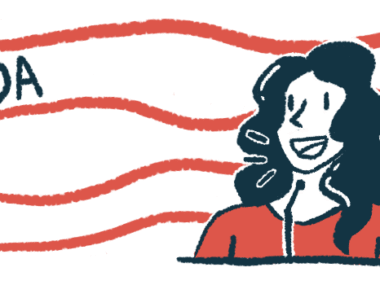I Miss My Childhood Fearlessness of Being Open About My CMT
Written by |

Once, while I was walking down the hallway with my classmates, my high school Spanish teacher asked me if I had hurt my ankles. It may have been the first time he had watched me walk. He then proceeded to walk ahead of my group to demonstrate my gait, imitating the way my body rocked from side to side and my right foot rolled awkwardly.
I wasn’t embarrassed and his impression didn’t offend me. His concern came from a good place, and I liked him as a teacher. But although I knew he was referring to a symptom of Charcot-Marie-Tooth disease (CMT), I responded by saying, “Naw, that’s just how I walk.” End of discussion.
That moment made me acutely aware of how I appeared to others. And it was the first time that I recall hesitating about telling others about CMT.
I don’t know what had changed by then. However, in many ways, I miss my childhood boldness.
Until that moment, I hadn’t considered myself timid about my CMT. It is true that by my upperclassman years I had given up my ankle-foot orthoses (AFOs) — perhaps one of the most visible aspects of CMT. But that was because they prevented me from keeping up with my marching band.
In elementary school, I relished the attention my AFOs brought me. I didn’t hesitate to educate others about what I knew about the disease. And I openly played around with my AFOs, treating them like toys in the playground. I thought that having CMT made me special.
And it does.
We say we aren’t our disability and that it doesn’t define us. And while that’s true, CMT has affected me. Going through its challenges has helped me grow, so the disease is part of my identity.
However, as I’ve gotten older and become aware of my own biases and prejudices, I think I’ve become fearful of how society treats those of us with disabilities. And I believe it’s a legitimate fear. It’s much easier for people to see you as the person you want to display to the world when folks don’t know about CMT.
And with a relatively invisible type of CMT, it has been easier for me to let people assume, as they often do, that the way I walk is due to a temporary injury. And over time, I guess my childhood boldness faded away. For a long time, I didn’t mark “disabled” when signing employment papers and I’ve never talked about having CMT in any of my workplaces.
I miss my childhood fearlessness — though it may have come from naiveté. Looking back, I admire the boldness I once had.
***
Note: Charcot-Marie-Tooth News is strictly a news and information website about the disease. It does not provide medical advice, diagnosis, or treatment. This content is not intended to be a substitute for professional medical advice, diagnosis, or treatment. Always seek the advice of your physician or other qualified health provider with any questions you may have regarding a medical condition. Never disregard professional medical advice or delay in seeking it because of something you have read on this website. The opinions expressed in this column are not those of Charcot-Marie-Tooth News or its parent company, Bionews Services, and are intended to spark discussion about issues pertaining to Charcot-Marie-Tooth.






Leave a comment
Fill in the required fields to post. Your email address will not be published.